Law Enforcement: Canadian Law, Arrest, and Use of Force
VerifiedAdded on 2020/05/01
|8
|1874
|68
Homework Assignment
AI Summary
This assignment analyzes various aspects of law enforcement, primarily within the Canadian legal framework. It begins by examining the challenges posed by sovereign citizens and their interactions with law enforcement, drawing on provided resources. The paper then delves into the use of force, outlining the legal parameters and considerations for officers during arrests, including scenarios involving potentially aggressive suspects. The assignment further explores the procedures of lawful arrest, including identification, informing suspects of their rights, and the use of handcuffs. It extensively covers the Canadian Charter of Rights and Freedoms, focusing on the rights of arrested individuals, such as the right to remain silent, the right to know the reason for arrest, and the right to legal counsel. The assignment clarifies the role of lawyers, the ability to question suspects, and the limitations on the use of evidence. Finally, it addresses the rights related to search and seizure, emphasizing the need for reasonable grounds and search warrants while acknowledging exceptions to this rule. The paper incorporates relevant legal principles, legislation, and case law to provide a comprehensive overview of law enforcement practices and the protection of individual rights.
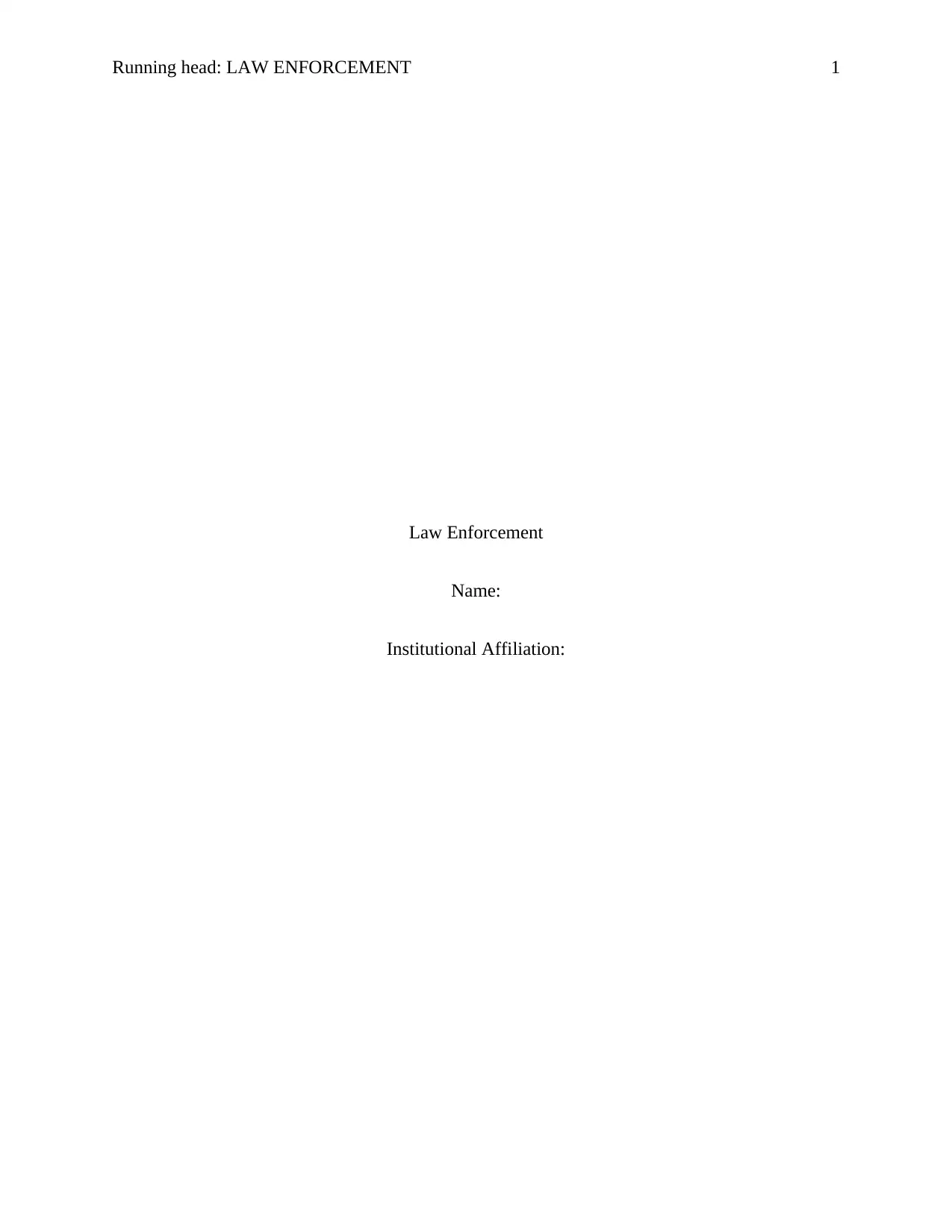
Running head: LAW ENFORCEMENT 1
Law Enforcement
Name:
Institutional Affiliation:
Law Enforcement
Name:
Institutional Affiliation:
Paraphrase This Document
Need a fresh take? Get an instant paraphrase of this document with our AI Paraphraser
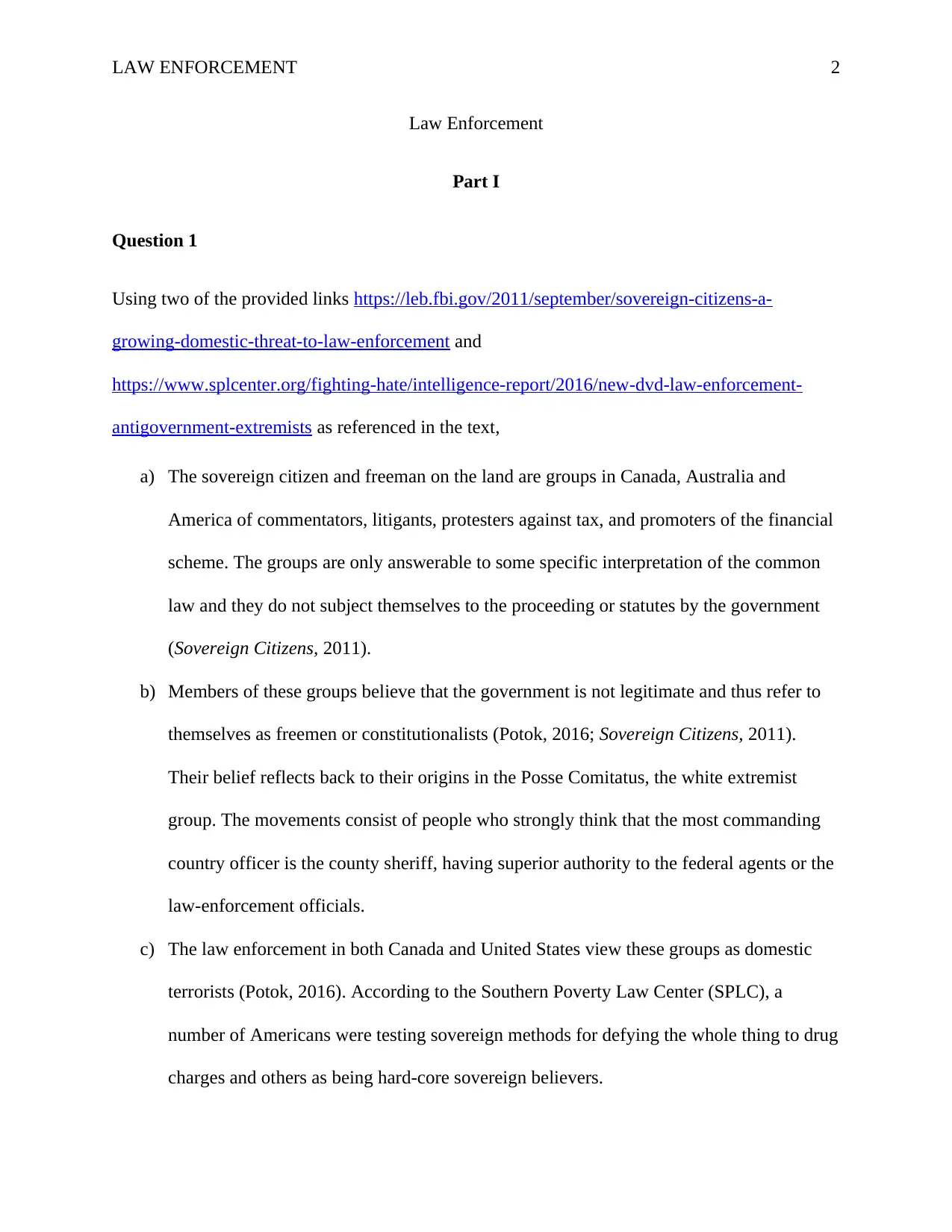
LAW ENFORCEMENT 2
Law Enforcement
Part I
Question 1
Using two of the provided links https://leb.fbi.gov/2011/september/sovereign-citizens-a-
growing-domestic-threat-to-law-enforcement and
https://www.splcenter.org/fighting-hate/intelligence-report/2016/new-dvd-law-enforcement-
antigovernment-extremists as referenced in the text,
a) The sovereign citizen and freeman on the land are groups in Canada, Australia and
America of commentators, litigants, protesters against tax, and promoters of the financial
scheme. The groups are only answerable to some specific interpretation of the common
law and they do not subject themselves to the proceeding or statutes by the government
(Sovereign Citizens, 2011).
b) Members of these groups believe that the government is not legitimate and thus refer to
themselves as freemen or constitutionalists (Potok, 2016; Sovereign Citizens, 2011).
Their belief reflects back to their origins in the Posse Comitatus, the white extremist
group. The movements consist of people who strongly think that the most commanding
country officer is the county sheriff, having superior authority to the federal agents or the
law-enforcement officials.
c) The law enforcement in both Canada and United States view these groups as domestic
terrorists (Potok, 2016). According to the Southern Poverty Law Center (SPLC), a
number of Americans were testing sovereign methods for defying the whole thing to drug
charges and others as being hard-core sovereign believers.
Law Enforcement
Part I
Question 1
Using two of the provided links https://leb.fbi.gov/2011/september/sovereign-citizens-a-
growing-domestic-threat-to-law-enforcement and
https://www.splcenter.org/fighting-hate/intelligence-report/2016/new-dvd-law-enforcement-
antigovernment-extremists as referenced in the text,
a) The sovereign citizen and freeman on the land are groups in Canada, Australia and
America of commentators, litigants, protesters against tax, and promoters of the financial
scheme. The groups are only answerable to some specific interpretation of the common
law and they do not subject themselves to the proceeding or statutes by the government
(Sovereign Citizens, 2011).
b) Members of these groups believe that the government is not legitimate and thus refer to
themselves as freemen or constitutionalists (Potok, 2016; Sovereign Citizens, 2011).
Their belief reflects back to their origins in the Posse Comitatus, the white extremist
group. The movements consist of people who strongly think that the most commanding
country officer is the county sheriff, having superior authority to the federal agents or the
law-enforcement officials.
c) The law enforcement in both Canada and United States view these groups as domestic
terrorists (Potok, 2016). According to the Southern Poverty Law Center (SPLC), a
number of Americans were testing sovereign methods for defying the whole thing to drug
charges and others as being hard-core sovereign believers.
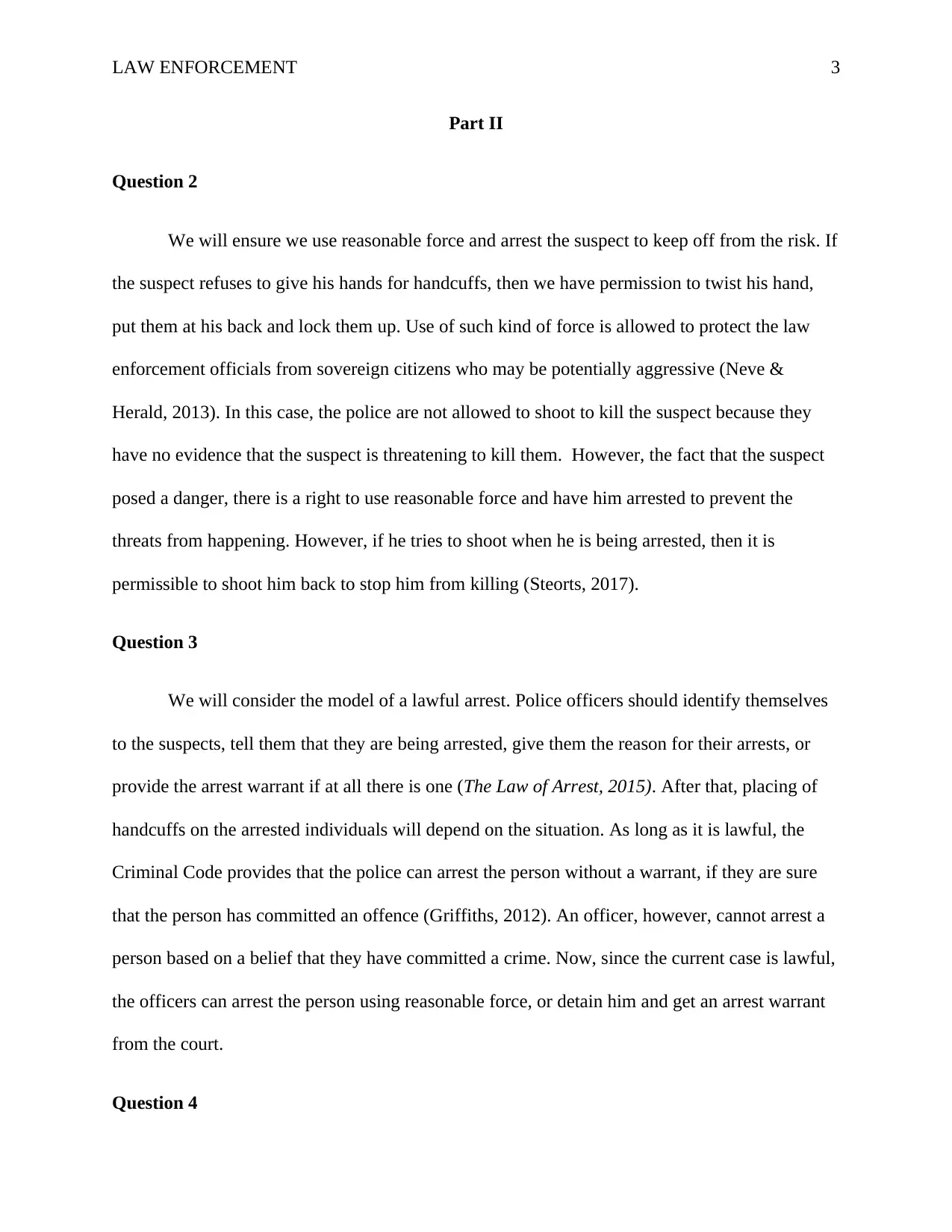
LAW ENFORCEMENT 3
Part II
Question 2
We will ensure we use reasonable force and arrest the suspect to keep off from the risk. If
the suspect refuses to give his hands for handcuffs, then we have permission to twist his hand,
put them at his back and lock them up. Use of such kind of force is allowed to protect the law
enforcement officials from sovereign citizens who may be potentially aggressive (Neve &
Herald, 2013). In this case, the police are not allowed to shoot to kill the suspect because they
have no evidence that the suspect is threatening to kill them. However, the fact that the suspect
posed a danger, there is a right to use reasonable force and have him arrested to prevent the
threats from happening. However, if he tries to shoot when he is being arrested, then it is
permissible to shoot him back to stop him from killing (Steorts, 2017).
Question 3
We will consider the model of a lawful arrest. Police officers should identify themselves
to the suspects, tell them that they are being arrested, give them the reason for their arrests, or
provide the arrest warrant if at all there is one (The Law of Arrest, 2015). After that, placing of
handcuffs on the arrested individuals will depend on the situation. As long as it is lawful, the
Criminal Code provides that the police can arrest the person without a warrant, if they are sure
that the person has committed an offence (Griffiths, 2012). An officer, however, cannot arrest a
person based on a belief that they have committed a crime. Now, since the current case is lawful,
the officers can arrest the person using reasonable force, or detain him and get an arrest warrant
from the court.
Question 4
Part II
Question 2
We will ensure we use reasonable force and arrest the suspect to keep off from the risk. If
the suspect refuses to give his hands for handcuffs, then we have permission to twist his hand,
put them at his back and lock them up. Use of such kind of force is allowed to protect the law
enforcement officials from sovereign citizens who may be potentially aggressive (Neve &
Herald, 2013). In this case, the police are not allowed to shoot to kill the suspect because they
have no evidence that the suspect is threatening to kill them. However, the fact that the suspect
posed a danger, there is a right to use reasonable force and have him arrested to prevent the
threats from happening. However, if he tries to shoot when he is being arrested, then it is
permissible to shoot him back to stop him from killing (Steorts, 2017).
Question 3
We will consider the model of a lawful arrest. Police officers should identify themselves
to the suspects, tell them that they are being arrested, give them the reason for their arrests, or
provide the arrest warrant if at all there is one (The Law of Arrest, 2015). After that, placing of
handcuffs on the arrested individuals will depend on the situation. As long as it is lawful, the
Criminal Code provides that the police can arrest the person without a warrant, if they are sure
that the person has committed an offence (Griffiths, 2012). An officer, however, cannot arrest a
person based on a belief that they have committed a crime. Now, since the current case is lawful,
the officers can arrest the person using reasonable force, or detain him and get an arrest warrant
from the court.
Question 4
⊘ This is a preview!⊘
Do you want full access?
Subscribe today to unlock all pages.

Trusted by 1+ million students worldwide
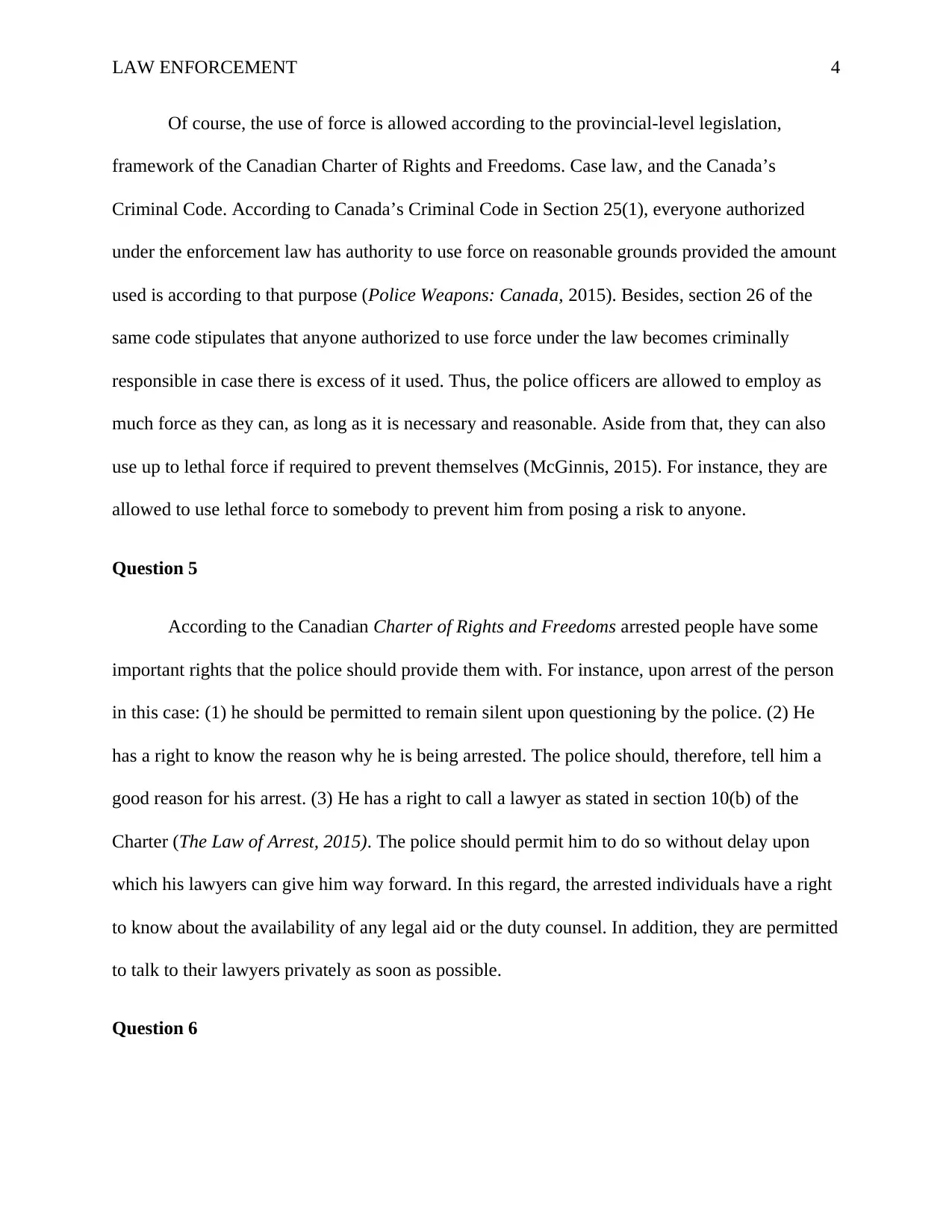
LAW ENFORCEMENT 4
Of course, the use of force is allowed according to the provincial-level legislation,
framework of the Canadian Charter of Rights and Freedoms. Case law, and the Canada’s
Criminal Code. According to Canada’s Criminal Code in Section 25(1), everyone authorized
under the enforcement law has authority to use force on reasonable grounds provided the amount
used is according to that purpose (Police Weapons: Canada, 2015). Besides, section 26 of the
same code stipulates that anyone authorized to use force under the law becomes criminally
responsible in case there is excess of it used. Thus, the police officers are allowed to employ as
much force as they can, as long as it is necessary and reasonable. Aside from that, they can also
use up to lethal force if required to prevent themselves (McGinnis, 2015). For instance, they are
allowed to use lethal force to somebody to prevent him from posing a risk to anyone.
Question 5
According to the Canadian Charter of Rights and Freedoms arrested people have some
important rights that the police should provide them with. For instance, upon arrest of the person
in this case: (1) he should be permitted to remain silent upon questioning by the police. (2) He
has a right to know the reason why he is being arrested. The police should, therefore, tell him a
good reason for his arrest. (3) He has a right to call a lawyer as stated in section 10(b) of the
Charter (The Law of Arrest, 2015). The police should permit him to do so without delay upon
which his lawyers can give him way forward. In this regard, the arrested individuals have a right
to know about the availability of any legal aid or the duty counsel. In addition, they are permitted
to talk to their lawyers privately as soon as possible.
Question 6
Of course, the use of force is allowed according to the provincial-level legislation,
framework of the Canadian Charter of Rights and Freedoms. Case law, and the Canada’s
Criminal Code. According to Canada’s Criminal Code in Section 25(1), everyone authorized
under the enforcement law has authority to use force on reasonable grounds provided the amount
used is according to that purpose (Police Weapons: Canada, 2015). Besides, section 26 of the
same code stipulates that anyone authorized to use force under the law becomes criminally
responsible in case there is excess of it used. Thus, the police officers are allowed to employ as
much force as they can, as long as it is necessary and reasonable. Aside from that, they can also
use up to lethal force if required to prevent themselves (McGinnis, 2015). For instance, they are
allowed to use lethal force to somebody to prevent him from posing a risk to anyone.
Question 5
According to the Canadian Charter of Rights and Freedoms arrested people have some
important rights that the police should provide them with. For instance, upon arrest of the person
in this case: (1) he should be permitted to remain silent upon questioning by the police. (2) He
has a right to know the reason why he is being arrested. The police should, therefore, tell him a
good reason for his arrest. (3) He has a right to call a lawyer as stated in section 10(b) of the
Charter (The Law of Arrest, 2015). The police should permit him to do so without delay upon
which his lawyers can give him way forward. In this regard, the arrested individuals have a right
to know about the availability of any legal aid or the duty counsel. In addition, they are permitted
to talk to their lawyers privately as soon as possible.
Question 6
Paraphrase This Document
Need a fresh take? Get an instant paraphrase of this document with our AI Paraphraser
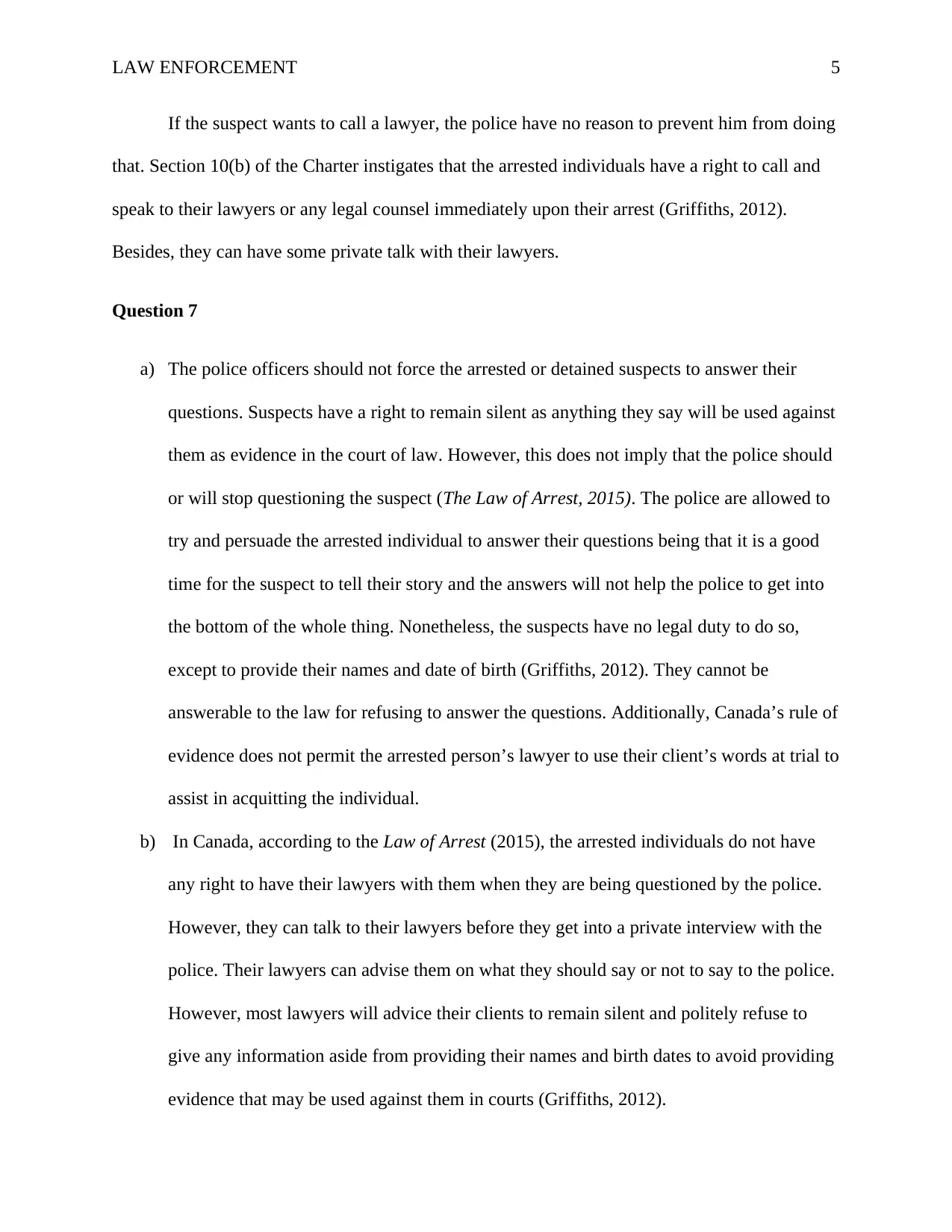
LAW ENFORCEMENT 5
If the suspect wants to call a lawyer, the police have no reason to prevent him from doing
that. Section 10(b) of the Charter instigates that the arrested individuals have a right to call and
speak to their lawyers or any legal counsel immediately upon their arrest (Griffiths, 2012).
Besides, they can have some private talk with their lawyers.
Question 7
a) The police officers should not force the arrested or detained suspects to answer their
questions. Suspects have a right to remain silent as anything they say will be used against
them as evidence in the court of law. However, this does not imply that the police should
or will stop questioning the suspect (The Law of Arrest, 2015). The police are allowed to
try and persuade the arrested individual to answer their questions being that it is a good
time for the suspect to tell their story and the answers will not help the police to get into
the bottom of the whole thing. Nonetheless, the suspects have no legal duty to do so,
except to provide their names and date of birth (Griffiths, 2012). They cannot be
answerable to the law for refusing to answer the questions. Additionally, Canada’s rule of
evidence does not permit the arrested person’s lawyer to use their client’s words at trial to
assist in acquitting the individual.
b) In Canada, according to the Law of Arrest (2015), the arrested individuals do not have
any right to have their lawyers with them when they are being questioned by the police.
However, they can talk to their lawyers before they get into a private interview with the
police. Their lawyers can advise them on what they should say or not to say to the police.
However, most lawyers will advice their clients to remain silent and politely refuse to
give any information aside from providing their names and birth dates to avoid providing
evidence that may be used against them in courts (Griffiths, 2012).
If the suspect wants to call a lawyer, the police have no reason to prevent him from doing
that. Section 10(b) of the Charter instigates that the arrested individuals have a right to call and
speak to their lawyers or any legal counsel immediately upon their arrest (Griffiths, 2012).
Besides, they can have some private talk with their lawyers.
Question 7
a) The police officers should not force the arrested or detained suspects to answer their
questions. Suspects have a right to remain silent as anything they say will be used against
them as evidence in the court of law. However, this does not imply that the police should
or will stop questioning the suspect (The Law of Arrest, 2015). The police are allowed to
try and persuade the arrested individual to answer their questions being that it is a good
time for the suspect to tell their story and the answers will not help the police to get into
the bottom of the whole thing. Nonetheless, the suspects have no legal duty to do so,
except to provide their names and date of birth (Griffiths, 2012). They cannot be
answerable to the law for refusing to answer the questions. Additionally, Canada’s rule of
evidence does not permit the arrested person’s lawyer to use their client’s words at trial to
assist in acquitting the individual.
b) In Canada, according to the Law of Arrest (2015), the arrested individuals do not have
any right to have their lawyers with them when they are being questioned by the police.
However, they can talk to their lawyers before they get into a private interview with the
police. Their lawyers can advise them on what they should say or not to say to the police.
However, most lawyers will advice their clients to remain silent and politely refuse to
give any information aside from providing their names and birth dates to avoid providing
evidence that may be used against them in courts (Griffiths, 2012).
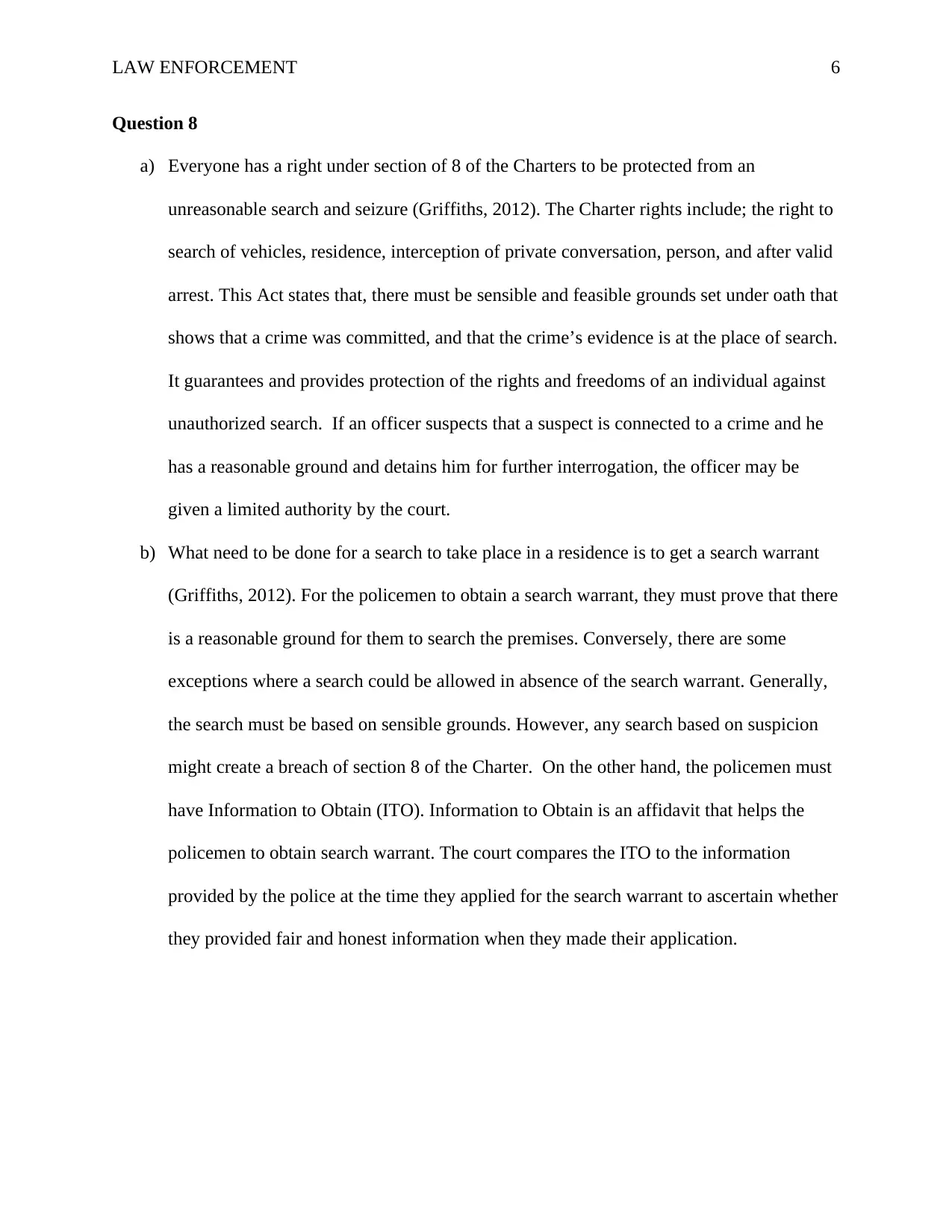
LAW ENFORCEMENT 6
Question 8
a) Everyone has a right under section of 8 of the Charters to be protected from an
unreasonable search and seizure (Griffiths, 2012). The Charter rights include; the right to
search of vehicles, residence, interception of private conversation, person, and after valid
arrest. This Act states that, there must be sensible and feasible grounds set under oath that
shows that a crime was committed, and that the crime’s evidence is at the place of search.
It guarantees and provides protection of the rights and freedoms of an individual against
unauthorized search. If an officer suspects that a suspect is connected to a crime and he
has a reasonable ground and detains him for further interrogation, the officer may be
given a limited authority by the court.
b) What need to be done for a search to take place in a residence is to get a search warrant
(Griffiths, 2012). For the policemen to obtain a search warrant, they must prove that there
is a reasonable ground for them to search the premises. Conversely, there are some
exceptions where a search could be allowed in absence of the search warrant. Generally,
the search must be based on sensible grounds. However, any search based on suspicion
might create a breach of section 8 of the Charter. On the other hand, the policemen must
have Information to Obtain (ITO). Information to Obtain is an affidavit that helps the
policemen to obtain search warrant. The court compares the ITO to the information
provided by the police at the time they applied for the search warrant to ascertain whether
they provided fair and honest information when they made their application.
Question 8
a) Everyone has a right under section of 8 of the Charters to be protected from an
unreasonable search and seizure (Griffiths, 2012). The Charter rights include; the right to
search of vehicles, residence, interception of private conversation, person, and after valid
arrest. This Act states that, there must be sensible and feasible grounds set under oath that
shows that a crime was committed, and that the crime’s evidence is at the place of search.
It guarantees and provides protection of the rights and freedoms of an individual against
unauthorized search. If an officer suspects that a suspect is connected to a crime and he
has a reasonable ground and detains him for further interrogation, the officer may be
given a limited authority by the court.
b) What need to be done for a search to take place in a residence is to get a search warrant
(Griffiths, 2012). For the policemen to obtain a search warrant, they must prove that there
is a reasonable ground for them to search the premises. Conversely, there are some
exceptions where a search could be allowed in absence of the search warrant. Generally,
the search must be based on sensible grounds. However, any search based on suspicion
might create a breach of section 8 of the Charter. On the other hand, the policemen must
have Information to Obtain (ITO). Information to Obtain is an affidavit that helps the
policemen to obtain search warrant. The court compares the ITO to the information
provided by the police at the time they applied for the search warrant to ascertain whether
they provided fair and honest information when they made their application.
⊘ This is a preview!⊘
Do you want full access?
Subscribe today to unlock all pages.

Trusted by 1+ million students worldwide
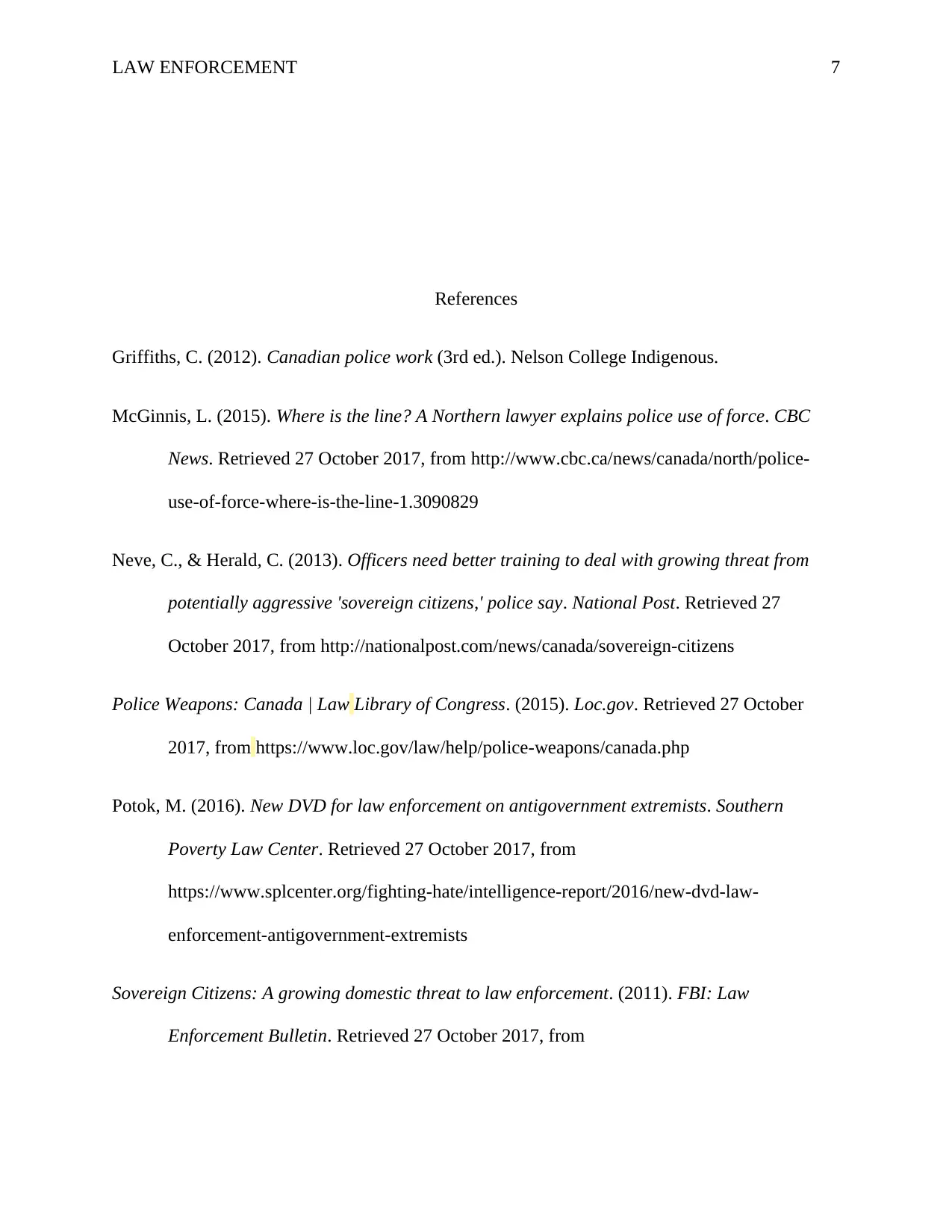
LAW ENFORCEMENT 7
References
Griffiths, C. (2012). Canadian police work (3rd ed.). Nelson College Indigenous.
McGinnis, L. (2015). Where is the line? A Northern lawyer explains police use of force. CBC
News. Retrieved 27 October 2017, from http://www.cbc.ca/news/canada/north/police-
use-of-force-where-is-the-line-1.3090829
Neve, C., & Herald, C. (2013). Officers need better training to deal with growing threat from
potentially aggressive 'sovereign citizens,' police say. National Post. Retrieved 27
October 2017, from http://nationalpost.com/news/canada/sovereign-citizens
Police Weapons: Canada | Law Library of Congress. (2015). Loc.gov. Retrieved 27 October
2017, from https://www.loc.gov/law/help/police-weapons/canada.php
Potok, M. (2016). New DVD for law enforcement on antigovernment extremists. Southern
Poverty Law Center. Retrieved 27 October 2017, from
https://www.splcenter.org/fighting-hate/intelligence-report/2016/new-dvd-law-
enforcement-antigovernment-extremists
Sovereign Citizens: A growing domestic threat to law enforcement. (2011). FBI: Law
Enforcement Bulletin. Retrieved 27 October 2017, from
References
Griffiths, C. (2012). Canadian police work (3rd ed.). Nelson College Indigenous.
McGinnis, L. (2015). Where is the line? A Northern lawyer explains police use of force. CBC
News. Retrieved 27 October 2017, from http://www.cbc.ca/news/canada/north/police-
use-of-force-where-is-the-line-1.3090829
Neve, C., & Herald, C. (2013). Officers need better training to deal with growing threat from
potentially aggressive 'sovereign citizens,' police say. National Post. Retrieved 27
October 2017, from http://nationalpost.com/news/canada/sovereign-citizens
Police Weapons: Canada | Law Library of Congress. (2015). Loc.gov. Retrieved 27 October
2017, from https://www.loc.gov/law/help/police-weapons/canada.php
Potok, M. (2016). New DVD for law enforcement on antigovernment extremists. Southern
Poverty Law Center. Retrieved 27 October 2017, from
https://www.splcenter.org/fighting-hate/intelligence-report/2016/new-dvd-law-
enforcement-antigovernment-extremists
Sovereign Citizens: A growing domestic threat to law enforcement. (2011). FBI: Law
Enforcement Bulletin. Retrieved 27 October 2017, from
Paraphrase This Document
Need a fresh take? Get an instant paraphrase of this document with our AI Paraphraser
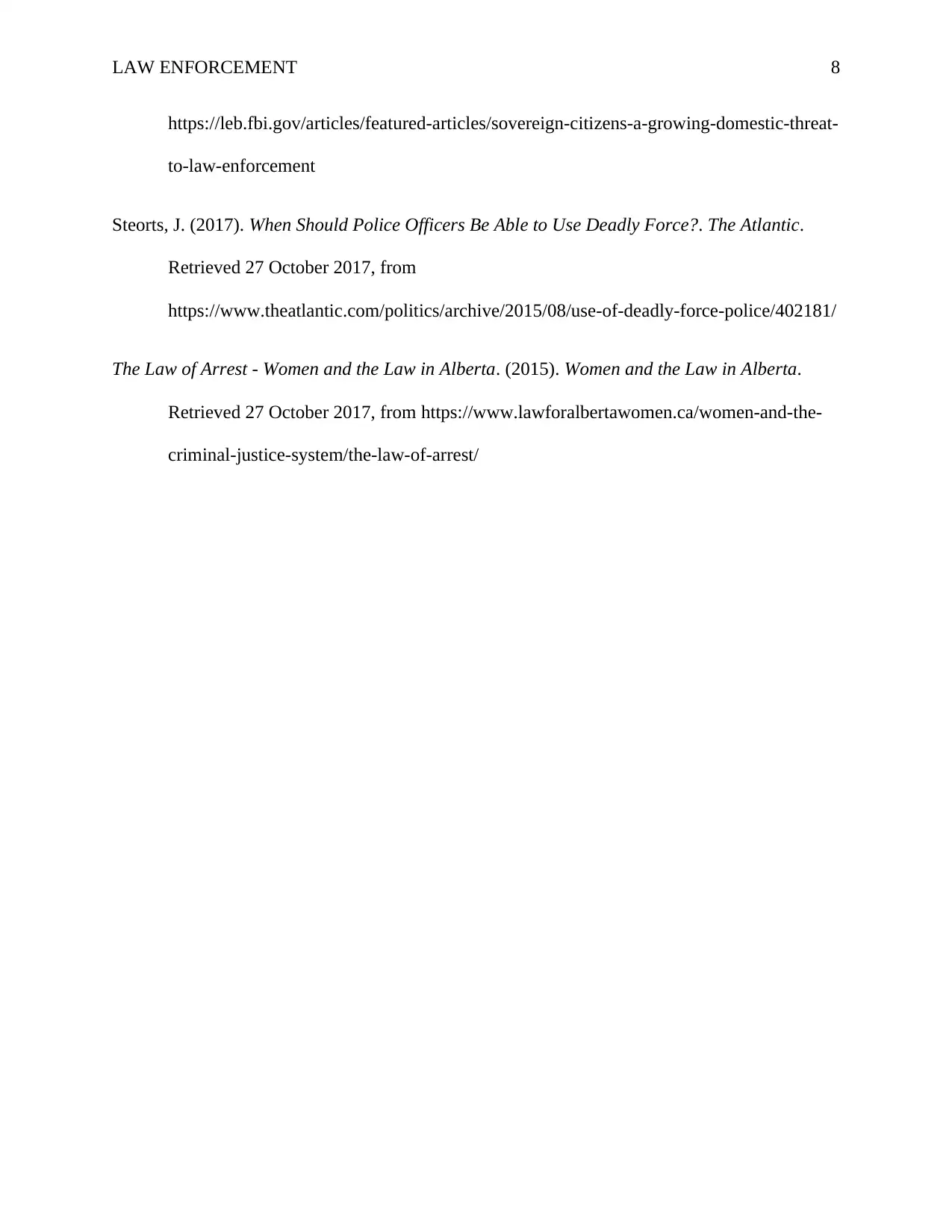
LAW ENFORCEMENT 8
https://leb.fbi.gov/articles/featured-articles/sovereign-citizens-a-growing-domestic-threat-
to-law-enforcement
Steorts, J. (2017). When Should Police Officers Be Able to Use Deadly Force?. The Atlantic.
Retrieved 27 October 2017, from
https://www.theatlantic.com/politics/archive/2015/08/use-of-deadly-force-police/402181/
The Law of Arrest - Women and the Law in Alberta. (2015). Women and the Law in Alberta.
Retrieved 27 October 2017, from https://www.lawforalbertawomen.ca/women-and-the-
criminal-justice-system/the-law-of-arrest/
https://leb.fbi.gov/articles/featured-articles/sovereign-citizens-a-growing-domestic-threat-
to-law-enforcement
Steorts, J. (2017). When Should Police Officers Be Able to Use Deadly Force?. The Atlantic.
Retrieved 27 October 2017, from
https://www.theatlantic.com/politics/archive/2015/08/use-of-deadly-force-police/402181/
The Law of Arrest - Women and the Law in Alberta. (2015). Women and the Law in Alberta.
Retrieved 27 October 2017, from https://www.lawforalbertawomen.ca/women-and-the-
criminal-justice-system/the-law-of-arrest/
1 out of 8
Related Documents
Your All-in-One AI-Powered Toolkit for Academic Success.
+13062052269
info@desklib.com
Available 24*7 on WhatsApp / Email
![[object Object]](/_next/static/media/star-bottom.7253800d.svg)
Unlock your academic potential
Copyright © 2020–2025 A2Z Services. All Rights Reserved. Developed and managed by ZUCOL.



